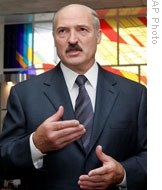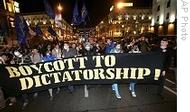-
(单词翻译:双击或拖选)
 |
| President Alexander Lukashenko speaks to media after voting at a polling station in the capital Minsk, 28 Sep 2008 |
All 110 seats in the Belarus parliament were contested, with 78 opposition3 candidates appearing on the ballot4. But when the final tally5 was counted, not a single candidate opposed to President Alexander Lukashenko won a seat.
International observers from the Organization for Security and Cooperation in Europe say the election fell short of democratic standards.
Klas Bergman was one of the OSCE observers. "Negative aspects were, of course, an election campaign which was extremely controlled - very little actual debate, very little campaigning in a free, democratic sense," he said. "On election day, the voting largely took place in a well-organized and calm atmosphere."
"We were well received at almost all of the polling stations where we sent observers - if not all of them. The big drawback came as the polls closed and when vote counting started - that's when we encountered a lot of problems," he added.
Bergman says the key problem was access to the vote count. "The fact that we could not really oversee6 how the counting was done and how it proceeded," he said. "Some of the observers were actually prevented from overviewing the vote count and we have some incidences of falsifications."
Before the vote, President Lukashenko said the balloting7 would be unprecedented8 in its fairness. But the OSCE said that was not the case, indicating the vote counting process was bad or very bad in 48 percent of polling stations visited.
But Russia praised the elections and criticized the OSCE assessment9. President Lukashenko told OSCE observers that the elections were conducted in line with Belarusian law.
 |
| Opposition activists10 protest against the parliamentary elections shortly after polling closed, in the Belarusian capital Minsk, 28 Sep 2008 |
David Marples, from the University of Edmonton [in Alberta, Canada] says with no opposition to speak of in parliament, that body is in essence a rubber-stamp legislature, agreeing to every policy presented by Mr. Lukashenko.
"Back in 1996, when the constitution was amended11, parliament really has played a secondary role to the presidency12 in the political life of Belarus," said Marples. "The president has the most powerful position - he can replace the prime minister. It is more of a talking shop, in other words, the parliament."
"But nevertheless, as a kind of facade13 of the political life, it gives an impression that Belarus does have some form of legislature where debates can take place and laws can be discussed. So I think it is kind of important for a president to retain a parliament - but obviously he does not want opposition members in this parliament," he continued.
Since coming to power in 1994, Mr. Lukashenko has governed Belarus with an iron fist, controlling the press, severely14 limiting opposing activities and cracking down on any form of dissent15.
Columbia University's Robert Legvold says the repression16 of human rights is even felt in universities. "The establishment of almost an ideological17 test within universities - that is universities had to conform to the standards and the agenda and the objectives - the political objectives - of the regime," he said.
"And over the years, going back to 1996, there have been constant struggles over the repression: if there are demonstrations18 of a few hundred people, heads are cracked and people are arrested. The most recent serious set of concerns or next to the most recent, were the elections in March 2006 where there were large crowds that assembled - it began to look a little bit like the 'color revolutions' [Georgia, Ukraine], at least in Lukashenko's mind - and that was repressed," he added.
Because of Mr. Lukashenko's repressive measures, western governments have described Belarus as the last dictatorship in Europe. Analysts19 say the recent parliamentary elections indicate very little has changed in that former Soviet republic.
 收听单词发音
收听单词发音
1
Soviet

|
|
| adj.苏联的,苏维埃的;n.苏维埃 | |
参考例句: |
|
|
|
2
authoritarian

|
|
| n./adj.专制(的),专制主义者,独裁主义者 | |
参考例句: |
|
|
|
3
opposition

|
|
| n.反对,敌对 | |
参考例句: |
|
|
|
4
ballot

|
|
| n.(不记名)投票,投票总数,投票权;vi.投票 | |
参考例句: |
|
|
|
5
tally

|
|
| n.计数器,记分,一致,测量;vt.计算,记录,使一致;vi.计算,记分,一致 | |
参考例句: |
|
|
|
6
oversee

|
|
| vt.监督,管理 | |
参考例句: |
|
|
|
7
balloting

|
|
| v.(使)投票表决( ballot的现在分词 ) | |
参考例句: |
|
|
|
8
unprecedented

|
|
| adj.无前例的,新奇的 | |
参考例句: |
|
|
|
9
assessment

|
|
| n.评价;评估;对财产的估价,被估定的金额 | |
参考例句: |
|
|
|
10
activists

|
|
| n.(政治活动的)积极分子,活动家( activist的名词复数 ) | |
参考例句: |
|
|
|
11
Amended

|
|
| adj. 修正的 动词amend的过去式和过去分词 | |
参考例句: |
|
|
|
12
presidency

|
|
| n.总统(校长,总经理)的职位(任期) | |
参考例句: |
|
|
|
13
facade

|
|
| n.(建筑物的)正面,临街正面;外表 | |
参考例句: |
|
|
|
14
severely

|
|
| adv.严格地;严厉地;非常恶劣地 | |
参考例句: |
|
|
|
15
dissent

|
|
| n./v.不同意,持异议 | |
参考例句: |
|
|
|
16
repression

|
|
| n.镇压,抑制,抑压 | |
参考例句: |
|
|
|
17
ideological

|
|
| a.意识形态的 | |
参考例句: |
|
|
|
18
demonstrations

|
|
| 证明( demonstration的名词复数 ); 表明; 表达; 游行示威 | |
参考例句: |
|
|
|
19
analysts

|
|
| 分析家,化验员( analyst的名词复数 ) | |
参考例句: |
|
|
|















